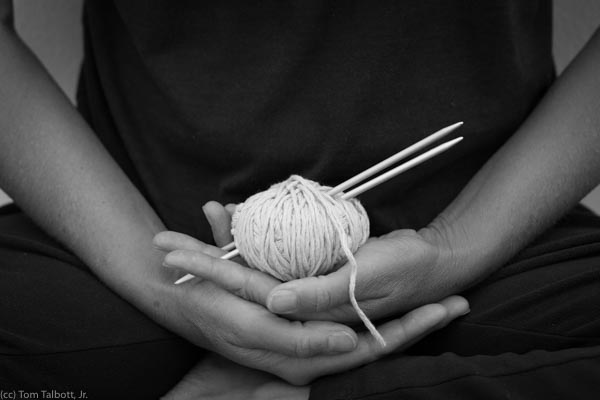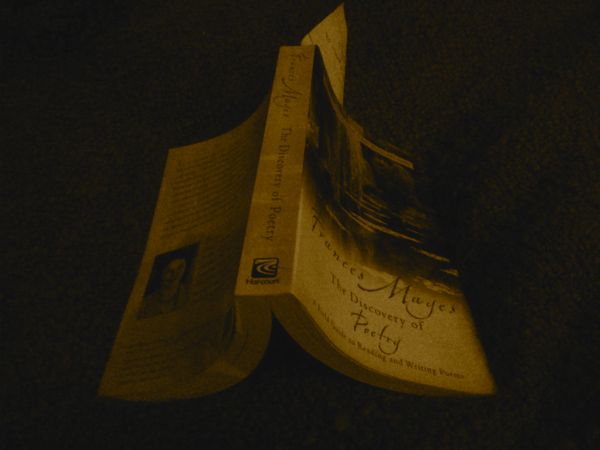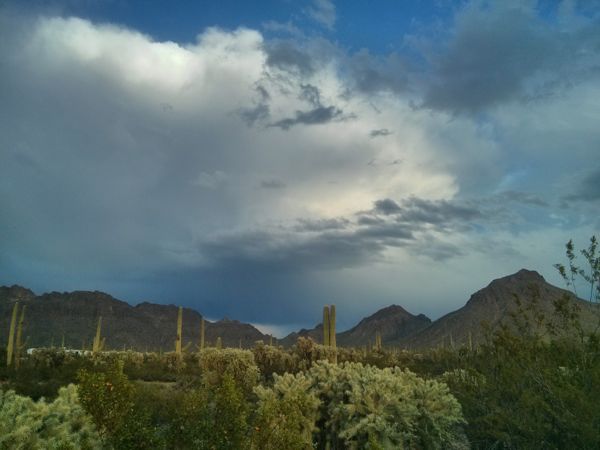Day 348: Zen and the Art of Knitting
 August 19, 2017
August 19, 2017 
Sometimes doing the wrong thing can turn out to be the right thing.
Many years ago my mom gave me a book called Zen and the Art of Knitting. The exact history of this gift is lost to me. I have never had the best long-term memory—and arriving on the other side of fifty hasn't improved it—but I think the book was a present for a birthday, or perhaps Christmas. If it was, though, it was one of those presents that I think even she downplayed. An I’m-not-sure-if-this-is-your-kind-of-book, but-I-got-it-for-you-anyway, kind of present.
At first I didn't read it because I often don't read books I am given right away. It takes me awhile to warm up to them. I have to live with the book for awhile before I know whether I want to open it. Besides, there is usually a pile of half-read books in line already that I need to work through before getting to the new one.
Then there was the problem with the title. While Zen and the Art of Motorcycle Maintenance was a favorite book of mine as a younger person, I am suspicious now of books that start with Zen and… . There is a faddishness to it that seems very un-Zen-like. And I dislike the way that Zen gets used to mean just about anything we want it to, especially something we want to sell.
And, on the other side of the coin, it seemed like a cheap shot. Really, is there anything so obviously Zen as knitting? Do I really need a whole book to tell me that knitting is everyday meditation?
So it sat unopened, moving about the house sometimes from one bookshelf to another in one of my library-reorganization schemes. Sometimes I would look at it and think about reading it, but it just never felt compelling enough. But any time I would think about giving it away, its status as a gift, especially a gift from my mother, would stop me.
So I kept it. Even through last year’s great purge of downsizing from a house to an 18-foot trailer. But now after almost a year on the road, I am doing some even deeper culling and I have been going through book-boxes with an eye to letting go.
So I pulled it out yesterday with the intention of sending it on. After all, I don't even knit these days, and my mom died two and a half years ago so I can’t talk to her about this book even if I did read it. It seemed like an obvious non-keeper.
But as I flipped through the book, looking for scraps of paper or bookmarks, I noticed that it had an inscription. Surely I must have known this? But my long-term memory was doing what it does best, and if I had known I’d forgotten. The inscription read:
Katie,
Pages 28-33 struck a special chord with me.
“... I see the hand of God in the details of my everyday existence. In my life it all comes as a package.”
“The insights I have gained into the spiritual and creative benefits of knitting seem Zen-like to me in their emphasis on finding the holy spark in everyday life, in sitting still, in letting things unfold.”
Love,
Mom
More than two years after her death, this inscription in her distinctive handwriting feels as if she has reached out unexpectedly with her old warmth from whatever realm she has disappeared to. And her invitation mirrors my current thoughts with an eerie accuracy. How much of this year has been about just this? Seeing God in the everyday. Recognizing that my life is an indivisible whole. And, most of all, simply learning to sit still and let things unfold.
I turn to the section she references, and it begins with the author sitting on her porch watching a swarm of newly hatched butterflies: The air is thick with them. They make shadows across the pad of paper on my lap. Another moment of synchronicity snaps across my consciousness as I think about the post I wrote this year about the beauty of the swarm of Ctenucha moths hatching at Madera Canyon.
Further on I read: I’ve learned to make peace with the chaotic nature of life, to sit still when upheaval surrounds me, to do nothing when nothing is required. This seems to apply to both Mom and me. I think about how Mom had to do this in the last years of her life, had to learn to really do nothing, as even knitting—something she excelled at—became too complex to enjoy. And at the same time it feels like through this book she is also speaking to me, letting me know that she understands what this year has meant to me. In this moment, concepts like past and present, or her and I fall away. Some kind of healing is happening, some kind of reorganization of my habits of thought.
At first, I feel a familiar guilt for not paying more attention to who she was. Why was I not more curious about something that she sent me because it meant something to her? Why could I not set aside my own life for a day or two to read this? But I know that my own circumstances and personality have made my struggle not so much about how to have empathy, but rather how to have boundaries. If I couldn’t see my mother, it was not because I was too distant, but because I was too entangled. With a kind of terrible irony it was her death that allowed me the room to be curious about who she was as a person, as someone apart from her role as my mother.
As I read further, I find that the book begins when the author also loses her mother, sometime in college. It begins with the author taking a trip to her ancestral country of Ireland, initially as a way to avoid her grief, but through this travel, finding solace in her interactions with her extended family.
I think if I had read this book back when Mom gave it to me it would not have had the impact it does now—that it would have just been about her. Waiting this long gave it an additional message, as though she was also saying to me, I know how hard it is to lose your mom, but I am right here still. I am always part of you, whether you know it or not. As far you go from "home" I am still there: in the people you meet, in the land you live in, in your hands and mind and heart.
Perhaps the question for me at the end of this year is, How would I live if I carried absolutely no more guilt about my relationship with my mother? If I accepted every part of it—her natural limitations, my natural limitations, the things each of us did or didn’t do—if I saw all of that as just the way it was, and knew instead the deeper connection between her and me and everything else, what would I do?
I can see now, in this ignored and forgotten book, how Mom was aware of what is most important to me—the sense of that perfection that exists right in the center of what is already. That reality that means that there is nothing you have to do or be or strive for or achieve—that what I am and you are is enough already, right now, in the midst of all of our imperfections. That doesn’t mean she (or I) always lived from this awareness, but that doesn’t matter. What matters is here, all the time, all around us, “costing not less than everything.”
We shall not cease from exploration
And the end of all our exploring
Will be to arrive where we started
And know the place for the first time.
Through the unknown, unremembered gate
When the last of earth left to discover
Is that which was the beginning;
At the source of the longest river
The voice of the hidden waterfall
And the children in the apple-tree
Not known, because not looked for
But heard, half-heard, in the stillness
Between two waves of the sea.
Quick now, here, now, always—
A condition of complete simplicity
(Costing not less than everything)
And all shall be well and
All manner of thing shall be well
When the tongues of flames are in-folded
Into the crowned knot of fire
And the fire and the rose are one.
from T.S. Elliot's "Little Gidding"
------------------------------
Tom and I have arrived in Salem, Oregon at our last planned destination of this year—his parent's house for the total solar eclipse. In the last couple months we have enjoyed time with my family on the farm near Spokane, a drive across Washington on Highway 20, and a brief visit to Seattle. Since being in Salem, I have finished reading Zen and the Art of Knitting, a book which now is a treasured reminder of Mom sitting in her favorite chair with her latest knitting project. Our year-long trip is officially over on September 5th. Now we just need to figure out what's next...

